COVID-19 Innovation at Cork Airport
COVID-19 Innovation at Cork Airport this week for all Heathrow and Gatwick bound passengers.
NOVID, the walk-through fogging device is designed to eliminate any prospect of COVID-19 on the person walking through AND their clothing and baggage by leaving an active 24hr barrier.
NOVID can be installed at any location, including airports, stations, underground’s, stadiums and many more
The mist is proven to be 99.999% effective against all enveloped viruses, including COVID-19, influenza and norovirus.
Walking through leaves no residue
100% biodegradable, non flammable, odourless, water based, environmentally-friendly and safe.
ISO 9001 Certification, ISO 13485, EN ISO 13485, HMC, SGS, CE & UK Halal Certification
Using a slightly different dilution rate for hard surfaces and as a handheld unit, the NOVID solution has now also been certified for use onboard aircraft by South African Airways/Star Alliance
Cork Airport is the the first to use NOVID booths to give staff a safer environment to work in and safer air travel for passengers. Is your airport/location next?
It’s been my pleasure to arrange this for NOVID with my Cork Airport colleagues, and I thank them for being open to new innovation
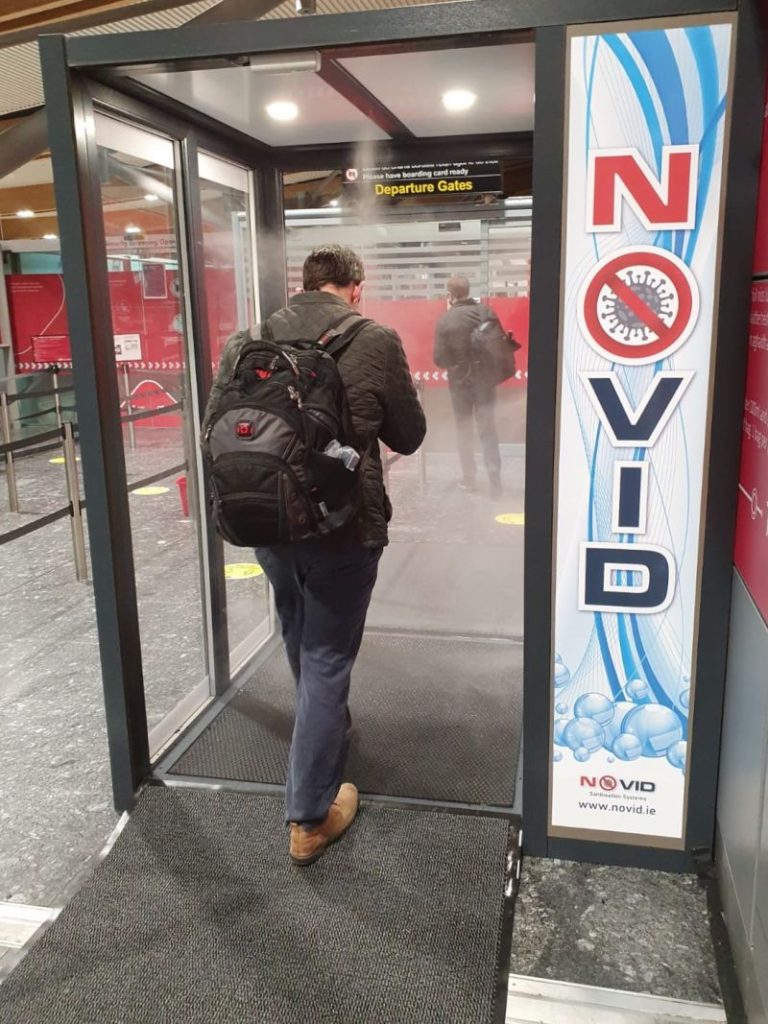
Find out more, purchase or rent NOVID booths:
daren.quinn@aviationeventsgroup.com
source : https://www.linkedin.com/posts/activity-6724219520971530240-lj7D/
COVID FOCUS FOR AIRPORT SAFETY WEEK
written by Adam Thorn October 19, 2020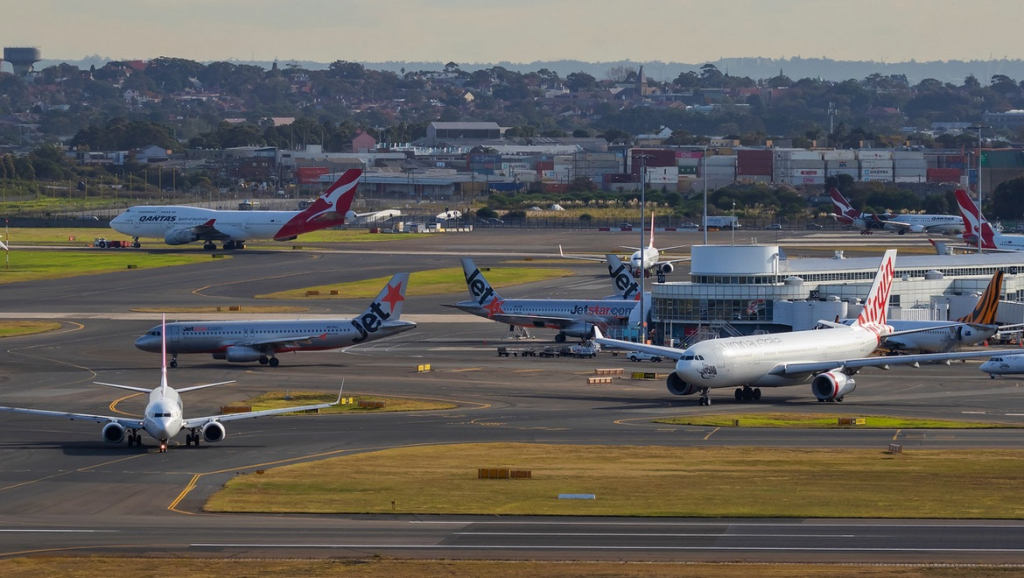
Australian domestic carriers at Sydney Airport. (Seth Jaworski)
The 2020 Airport Safety Week campaign started on Monday with participation from more than 100 airports and aerodromes across Australia and New Zealand.
This year’s event will have a special focus on tackling the COVID-19 pandemic and feature webinars, training sessions, evacuation drills, presentations and emergency night-time exercises.
It will also include the ‘foreign object debris walk’ (FODWALK), where staff walk along the runway tarmac to look for objects that could harm aircraft such as rocks, animals, rubber and metal.
Australian Airports Association chief executive James Goodwin said, “It’s been the worst year on record for Australia’s airports and during this unprecedented time, the health and safety of staff and passengers is more important than ever.
“Airport Safety Week is an opportunity to show the travelling public how we ensure high safety standards right across the airport sector. It’s also a chance to engage with staff and bring people together, which has been particularly difficult in the past few months.
“We all have a responsibility to look out for our colleagues, their safety and importantly their wellbeing during this difficult time for our industry. These activities help employees learn more about critical safety operations beyond their everyday work.”
source : https://australianaviation.com.au/2020/10/covid-focus-for-airport-safety-week/
COVID-19: How Dubai Airport security remains on high level to ensure smooth travel?
The pandemic forced the airports across the world to change their security methods
Published: October 13, 2020 09:51Ali Al Shouk, Senior Reporter
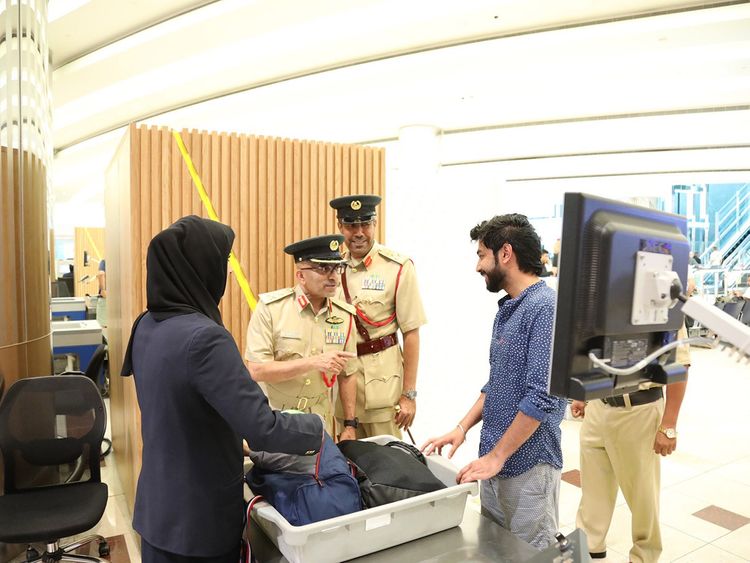
Dubai: Dubai regained the traveller’s trust during COVID-19 as the most dreadful part of air travel is undoubtedly getting through security, a senior official told Gulf News.
Major General Pilot Ahmed Mohammed Bin Thani, Assistant to the Commander-in-Chief for Ports Affairs, said the outbreak of the pandemic forced the airport security across the world to change their security methods and train their cadres on securing the airport despite the precautionary measures to curb COVID-19.
The Dubai Civil Aviation Security Centre at Airport Security Department at Dubai Police has trained more than 4,080 policemen through 26 online and on-site workshops to raise their security level and protect themselves while they are on duty. “Airports were key points to transmit COVID-19. It considers a high risk spots. We wanted to make sure that security level remains similar to before the pandemic by training security members on protecting themselves while checking passengers,” Maj Gen bin Thani told Gulf News in an exclusive interview.
Protective gear
He said that all police members at the airports were provided with protective gear and trained on keeping social distancing, using the sanitisers and how to deal with infected travellers. “With implementing precautionary measures at Dubai Airports and other elements, Dubai regained the traveller’s trust. Airport security in Dubai is a role model on how to operate airports safely during a pandemic.”Major General Pilot Ahmed Mohammed Bin Thani

Major General Pilot Ahmed Mohammed Bin Thani
From checking travellers at transit area to search the luggage and metal detector gates, Maj Gen Bin Thani said that using latest technologies and artificial intelligence methods helped to reduce the contact between policemen and travellers. “Dubai Police use highly developed inspection devices and AI technology like face recognition cameras inside the airport to guarantee a high level of security and less direct contact with travellers,” Maj Gen Bin Thani added.
He said that all policemen at Dubai Airports Security Department were COVID-19 free due to the training and using protective methods.
Police help stranded travellers
As lockdowns and border closures triggered by COVID-19 hurt international travel, Dubai Police helped many transit passengers during the crisis. “With millions of transit travellers, some of them were in Dubai when their flights to their destination were cancelled and they stayed for some time at the airport. We worked with concerned authorities to help those passengers by support them with food and shelter,” Maj Gen Bin Thani said, adding that Dubai Police even bought tickets for them and helped to put them in repatriation flights to their destination.
As passengers travel through Dubai International Airport, one of the world’s largest travel hubs, dropped in 2020 due to the coronavirus pandemic, Maj Gen Bin Thani expects the number will increase in 2021 and reach the same number of passengers in 2019 when around 87 million travellers passed through Dubai Airports.
Civil Aviation Security Centre
The training Centre, accredited by the International Civil Aviation Organization “ICAO”, organises specialised courses in airport security sector for participants from all around the world. The centre gives accreditation to the participant verified from ICAO after finishing the workshops. It is the biggest training centre in the region and part of 34 training centers across the world.
Maj Gen Bin Thani said the training centre organised workshops for 2,632 inspectors from different government departments during COVID-19’s era. “Besides the usual workshops and training, the centre created sessions about COVID-19 protocol at airports and how the inspector protects themselves from the virus and to seal the security gaps during the pandemic,” Maj Gen Bin Thani added.
Hamad International Airport and Qatar Duty Free scoop two trophies at Travel Retail Awards 2020

Doha: Hamad International Airport (HIA) and Qatar Duty-Free (QDF) were voted by passengers as “Best Airport Voted for by Millennials” and “Best Airport Retail Environment” respectively at the Travel Retail Awards 2020.
Over 5,000 passengers who had travelled within the past six months voted on 61 airports from every region across the globe – North America, Latin America, Europe, Africa and the Middle East, Asia, Indian Sub-Continent, and Pacific.
HIA and QDF were awarded both accolades from a shortlist of six other international airports. Millennial voters singled out the airports shopping environment, local identity, and food and beverage offer.
The awards ceremony was broadcast live online during the TRMarketplace Digital Forum, in the attendance of VIPs and delegates from across the global travel retail industry.
Millenials are a key demographic for the airport, which is a diverse lifestyle destination that puts passengers at the heart of its strategy. Qatar Duty Free will shortly be unveiling some exciting new retail concepts at Hamad International Airport, which will provide its passengers with a new and enhanced shopping experience.
Despite the ongoing global pandemic, HIA and QDF have continued to innovate and invest in evolving the retail and F&B experience for passengers. While recent new store openings have added to the 40,000 square meters of uniquely combined shopping and dining experiences operated by QDF, HIA continues to work on its stunning expansion, which will expand QDFs shopping and food and beverage space by 30%.
HIA has also implemented a series of initiatives to help fight the spread of COVID-19. The airport introduced new protocols and procedures to adapt to the different needs of passengers and restore their trust in travel again. Qatars airport also introduced a suite of technologies that aims to boost passenger confidence such as robotics and advanced thermal screening helmets. HIA has recently become one of the few airports to introduce paperless air travel through its investments in facial biometric identification.
The airport also installed C2 technology for transferring passengers, which allows transferring travelers to move through security checkpoints without having to take out any electronic devices from their bags and is a significant counter COVID-19 measure that reduces possible cross-contamination in passenger carry-on bags.
HIAs retail and food and beverage outlets encourage contactless and cashless transactions through cards and are considering introducing online or in-app purchases in the future. The airport also conducts regular disinfection of all baggage trolleys and tubs.
HIA will continue to innovate in the passenger experience on various fronts to help restart the aviation industry globally while creating a holistic environment for travelers. Through the airport’s efforts, passengers are guaranteed a safe smooth journey.
Physical distancing ‘cuts airport capacity by 75%’
MONTREAL, Canada, 9 hours, 28 minutes ago
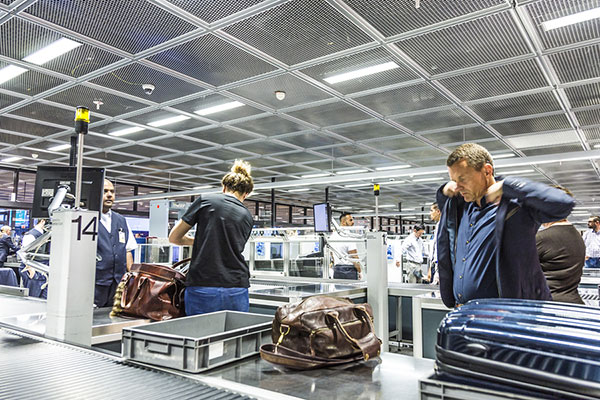
Airports Council International (ACI World) has released findings of simulations on the impact of applying physical distancing at airport security checkpoints which show capacity could be reduced by up to 75%.
These are represented in the Security Checkpoint Modelling videos.
Working with EBEA Consulting and Transoft solutions, ACI World has designed 11 alternative measures to physical distancing keeping passengers and staff safe while, at the same time, keeping checkpoints moving when passenger traffic inevitably increases.
These measures are explained in the Security Checkpoint Modelling videos, one for high throughput airports (greater than 250 pax/hour per security lane), the other for airports with a more standard flow of traffic (lower than 250 pax/hour per security lane).
While the impact and effects of the Covid-19 pandemic brought airports to a virtual standstill, airports around the world are planning for a return of passengers while also providing for extra measures to protect passengers and employees. Security checkpoints are a key consideration.
“Airports are examining all aspects of their operations as they seek to recover from the impact of Covid-19, foster confidence in air travel, and reassure passengers that health and safety is the number one priority,” ACI World Director General Luis Felipe de Oliveira said. “These simulations and resulting suggested mitigation measures encourage regulators and airports to plan ahead to facilitate an increase in passenger numbers, without having to compromise on health and safety.”
EBEA’s Director and Co-Founder Ramon Anton said he was delighted to collaborate with ACI World on this crucial assessment for airports.
“It demonstrates that there will be a point as traffic recovers, in which physical distancing may not be compatible with an efficient security checkpoint operation,” Ramon Anton said. “This flags the need for airport operators to start taking action now to be better prepared for when this time comes. Implementing alternative measures will ensure a smooth and safe passenger experience in every stage of the recovery process.”
Physical distancing has proven to be a good mitigation measure against the spread of the virus but once passenger traffic increases, this will not be viable or sustainable long term, if airports are to keep operations running efficiently.
Three scenarios were tested to include the need for increased space for physical distancing in the queue. The results suggest that the checkpoint capacity was reduced by up to 75% in the worse-case scenario. Even in the best-case scenario, there was a reduction in 50% capacity of a security checkpoint when implementing physical distancing.
The 11 different mitigation measures to physical distancing are designed to keep passengers and staff safe. Some examples include:
• Face masks
• Pre-travel testing
• Continuous tray or UVC cleaning and high touchpoint cleaning
• Installation of plexiglass, and
• Crowd monitoring software
“Alternative measures proposed to physical distancing will still achieve the same outcome, where passenger and staff members remain well protected, while reducing the impact of delays on airport operations,” Luis Felipe de Oliveira said. “By adopting measures that are aligned with other industries, airports can demonstrate that they are following best practices and the World Health Organization guidance, and in so doing, can help increase passenger confidence.”
These measures meet ACI World’s Smart Security vision to increase security, operational efficiency and improve customer experience at checkpoints. While many airports are exploring touchless processes, these measures can help airports until such technologies are implemented. – TradeArabia News Service
Singapore Changi, world’s best airport, warns of grim recovery for travel, aviation
Changi Airport Group has already shut down two terminals and cut salaries by as much as 30 percent in order to serve operating costs. It said the industry’s recovery would hinge on border controls and a medical treatment for the virus.
The operators of the world’s best travel hub for the eighth year in a row, Singapore Changi Airport, said that travel curbs and restrictions would continue to be a “daunting” challenge for the international travel industry to recover from.
Changi Airport Group has already shut down two terminals and cut salaries by as much as 30 percent in order to serve operating costs, Bloomberg reported. The Singapore airport, which saw a downturn in passenger traffic for the first time in a decade in FY20 at the beginning of a wave of coronavirus-induced flight restrictions, said the industry’s recovery would hinge on border controls and a medical treatment for the virus.
“The battle with COVID-19 has only just begun,” the company said in its annual report, according to the article. “The future does appear daunting with the situation showing no signs of abatement.”The world-class hub had opened a new ‘Jewel’ entertainment hub in 2019 that boasts of the world’s highest indoor waterfall. It has helped it boost revenues. But the construction of a fifth terminal has been delayed by two years as it faces the least flight traffic in its history, the article said.
Coronavirus-sniffing robots offer a testing alternative, startup bets
Koniku’s Konicore scent-detection device ( Source: Koniku)
3 min read. Updated: 01 Oct 2020, 05:34 PM ISTKristen V. Brown, Bloomberg
A biotechnology startup called Koniku is trying to develop robots that could sniff out Covid-19 infections faster than conventional testing.
A biotechnology startup called Koniku is trying to develop robots that could sniff out Covid-19 infections faster than conventional testing.
The technology fuses neurons with a silicon chip to create a “smell cyborg” capable of detecting scents ranging from explosives to pathogens.
Koniku’s first clinical trial began three weeks ago and will examine samples from patients tested for Covid-19 to compare how well the smell-bot detects the virus compared with traditional methods. Small internal trials have already demonstrated that it can accurately detect the presence of influenza A.
“Our goal is to have a device that merges synthetic biology with silicon and maps all of the smells of human life on a global scale,” said Oshiorenoya Agabi, the San Rafael, California-based company’s chief executive officer and co-founder. “We should have a device in every home in America to screen for disease.”
Pathogens produce unique volatile organic compounds, scent-fingerprints of a sort, released by ailing cells. These signature smells are the same biological clues that allow dogs to sniff out dozens of diseases. Finland tested the ability of dogs to detect Covid-19 in a trial at Helsinki’s airport last month.
Some researchers have suggested that using dogs could be cheaper, faster and even potentially more effective in screening for the disease than methods including temperature checks, nasal swabs and saliva. In July, German researchers showed trained dogs were able to distinguish between saliva sampled from people infected with the virus and those who were not more than 90 percent of the time.
Koniku’s device, the Konicore, is slightly smaller than a frisbee and resembles a flying saucer. When the proteins in its chip bind to a scent it has been programmed to detect, cells amplify and process those signals with help from machine learning, and the device lights up.
In a recent field test in Alabama, it was able to detect explosives better than trained dogs. The test was conducted by law-enforcement officials and aerospace giant Airbus SE, a Koniku investor and partner that has been working to roll out the technology in airports.
Koniku plans to conduct field trials with Airbus at Changi Airport in Singapore and then San Francisco International Airport later this year.
Smell camera
“If a dog can smell it, we can,” said Agabi, who describes the Konicore as a “smell camera.” He imagines the technology could be useful far beyond bombs and diseases. For example, he said, it could digitize the taste of food, allowing for the synthetic recreation of things like bacon.
Koniku’s merger of biology and computing technology — often termed “wetware” — is a growing field. The company’s investors include Softbank, Platform Capital, Halfcourt Ventures, Changi Airport and Airbus’s venture-capital arm.
Koniku has hired Treximo, a biotech consulting and project management company, to conduct its trials for SARS-CoV-2. Trials for new devices are typically far faster and less intensive than those for new drugs. Treximo said it expects it will be done with the necessary steps to apply for an emergency-use authorization with the Food and Drug Administration in the first quarter of 2021.
“We know this device can smell explosives, but can we have it pick up organic compounds in human breath to say yes or no does this person have SARS-CoV-2?” said Treximo CEO Michael Stomberg. “It’s a game-changing device if it proves to be valid.”
The devices will go on pre-sale for hardware developers this week.
After Covid-19, Agabi imagines the company pursuing other diseases insurance companies might be inclined to cover the cost of a test for, such as lung cancer. In the future, if successful, it could be used not just in homes, but for mass detection of diseases and pathogens in public spaces.
“Telehealth is growing,” said Agabi. “Our goal is not another Zoom application, but to actually bring technology closer to people to be able to screen disease in real time.”
Abu Dhabi Airport launches faster transit service for passengers
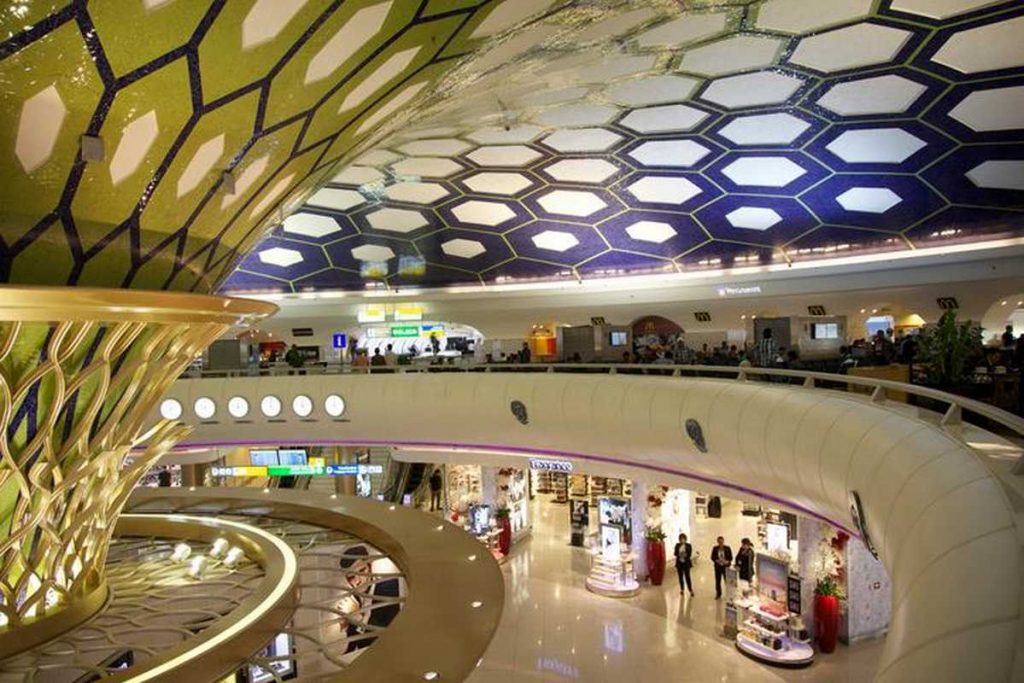
Abu Dhabi International Airport has launched a new initiative for international transfer passengers, facilitating shorter connection times by increasing the speed of transiting through the airport by 27 per cent, delivering an enhanced and seamless passenger experience.
The Fast Track Flight Connections initiative enables transfer passengers travelling aboard flights originating from partner airports in Europe, the United States, and Canada to take advantage of the new, streamlined security screening processes within Abu Dhabi International Airport. Under the new procedure, the flow of passengers and their baggage to their onward destination will be expedited.
This initiative was developed and implemented in collaboration with the General Civil Aviation Authority, the Department of Municipalities and Transport, the General Administration of Customs, Abu Dhabi Airports, Etihad Airways, and international airport partners.
Sheikh Mohammed bin Hamad bin Tahnoon Al Nahyan, Chairman of Abu Dhabi Airports, said: “The development and implementation of the new Fast Track Flight Connections initiative at Abu Dhabi International Airport comes as a part of our wider efforts to support the growth of air travel and transport in the post-pandemic era. By facilitating faster and more efficient transfers, the new procedure also further positions Abu Dhabi as a global hub, bridging the East and West.”
The initiative will be rolled out in two phases, with the first commencing with Etihad Airways flights originating from select destinations in Europe and North America, significantly benefiting airlines operating out of the Western Hemisphere.
The second phase is proposed to begin in 2021 and involve a wider range of airlines, additional points of origin, and include new procedures for transfer cargo alongside passengers.
With the annual rise in demand for air travel, airports globally have identified the need to improve the efficiency of processes handling passengers and baggage from airport to airport.
Copyright © 2020 Khaleej Times. All Rights Reserved. Provided by SyndiGate Media Inc. (Syndigate.info).
source : http://facedxb.com/abu-dhabi-airport-launches-faster-transit-service-for-passengers/
Paris Airport CEO conference 2020
Here is the the video of Augustin de Romanet, CHAIRMAN AND CHIEF EXECUTIVE OFFICER of Paris Airports at
annual conference of the circle of economists in Aix en Provence 2020.
Lasting consequences of the crisis on the air transport sector, voluntary departure plan, adaptation of the economic and industrial model, privatization suspended: Augustin de Romanet, CEO of ADP, reacts to the news since the Economic Meetings of Aix en Provence. Interview is in french.
and here is his this morning tweet :

This tweet is saying :
More than a million jobs in Europe depend on the reestablishment of air connectivity today at standstill. Ms. @vonderleyen to create a common health framework in Europe that will allow traffic to resume

